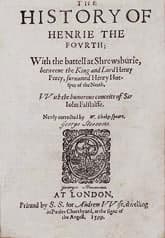

We know people of all types of character and personality in our lives. He helps us relate to Hal and his decision. Falstaff’s wit, humor, and amusing antics are needed to develop Hal. This scene and therefore Falstaff’s very being is significant to show Hal’s evolution into a “true” prince.įalstaff’s character is necessary to Hal’s character development just as Hotspur’s temperament is necessary to his.

He is indicating that he has chosen the path for his life and made his own moral judgment on Falstaff. He indicates that after becoming king he would choose to rid the kingdom of people the likes of Falstaff. Hal, again as the King, says, “I do, I will”. In Act 2, Scene 4, after Hal says, while role-playing as the King with Falstaff, “That villainous abominable misleader of youth, Falstaff, that old white-bearded Satan”.įalstaff, as Hal, tries to reason, “No, my good lord, banish Peto, banish Bardolph, banish Poins, but for sweet Jack Falstaff, kind Jack Falstaff, true Jack Falstaff, valiant Jack Falstaff, and therefore more valiant, being as he is old Jack Falstaff, banish not him thy Harry’s company, banish him not thy Harry’s company banish plump Jack, and banish all the world”. Johnson’s last assumption that the “Falstaff” scenes have nothing to do with the main action is incorrect if you agree that this sub-plot is necessary for an engaging drama. This story would be pretty dull if Hal didn’t have to choose between an entertaining life like Falstaff’s or an honorable one as a gallant warrior and respected leader. Falstaff is of paramount importance to the sub-plot dealing with Hal’s decision between continuing his carefree lifestyle or maturing into the role he is destined to play as a respected prince and later king. Johnson’s second assumption that you can detach Falstaff’s frivolity from the real drama is in fact true, but what would you have left? A less interesting, less amusing drama with only one main plot. It all easier for Hal to ultimately recognize that this is not the kind of person or people he wants to associate himself with, let alone approve of. It makes the reader question, what kind of friend is he to Hal that he would misuse the trust that has been given him. Once again, with no concern for anyone else, he potentially jeopardizes the troops, the battle, and the kingdom with substandard men and materials while making money for himself. When he misuses the money intended to buy troops and weapons, he turns it into profit for himself. He will protect himself at all costs including playing ” possum” if necessary to avoid injury. He is self-centered and cares only for his own profit and enjoyment. Is he a coward, a thief, a glutton? No one can deny that he is in fact a glutton and a thief. Any discussion of Falstaff is bound to include a judgment about his moral character. Starting with Johnson’s first assumption, I do agree with this. This means that the play has no real unity. That the play is really about the fate of the kingdom, and that you (the reader) do not connect Falstaff’s scenes with the main action. That you (the reader) can detach Falstaff’s frivolity from the play and it can exist for its own sake apart from the major theme of the drama.ģ. That Falstaff is the kind of character who invites a moral judgment mainly that he can answer to the charge of being a coward.Ģ. Johnson makes three assumptions in his reading of the play:ġ. his wit is not of the splendid or ambitious kind, but consists in easy escapes and sallies of levity he is stained with no enormous or sanguinary crimes, so that his licentiousness is not so offensive but that it may be borne for his mirth.”

a thief, a glutton, a coward, and a boaster, always ready to cheat the weak and prey upon the poor to terrify the timorous and insult the defenseless. a character loaded with faults, and with faults which produce contempt.


 0 kommentar(er)
0 kommentar(er)
